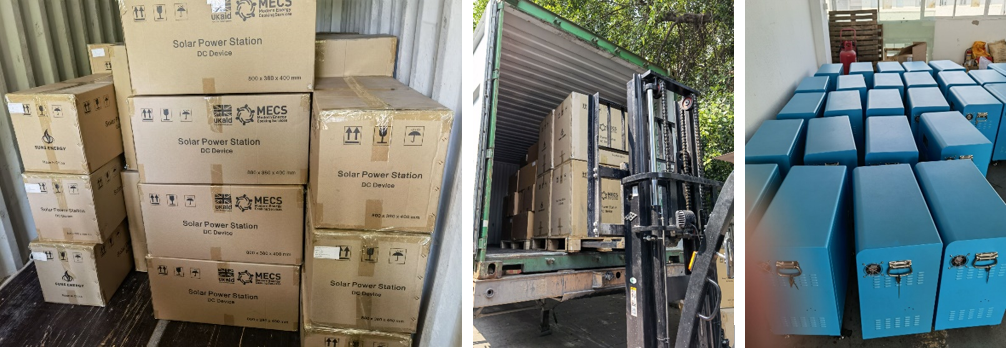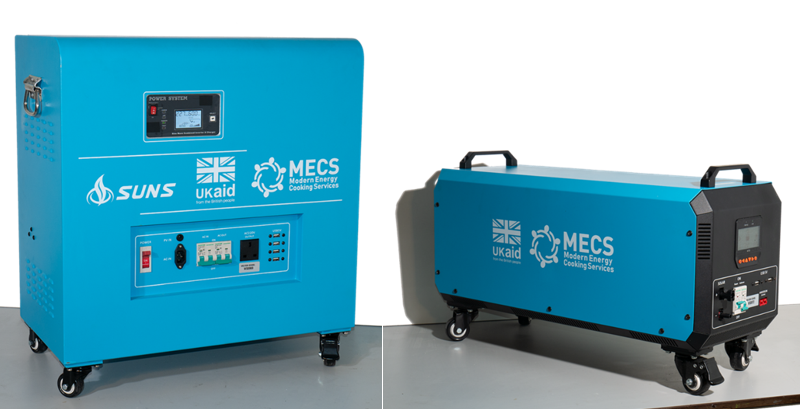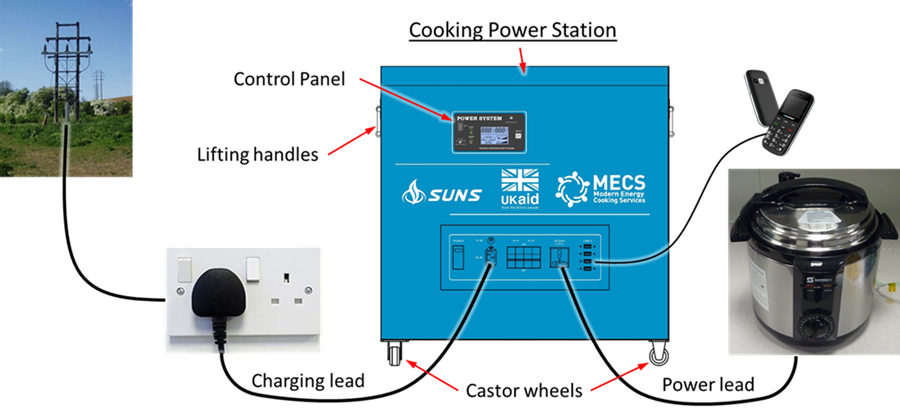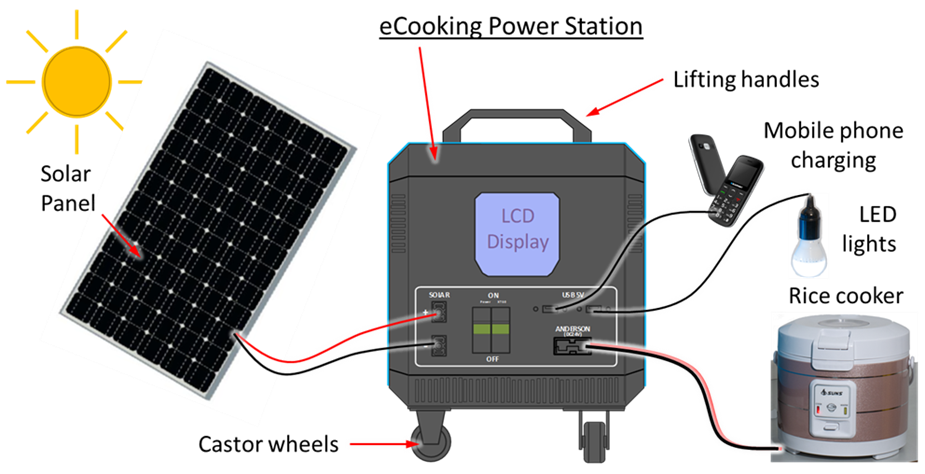- Date
- 27th May 2021
- Categories
- General
By Dr Nigel Monk, Centre for Renewable Energy Systems Technology (CREST), Loughborough University.
A major investigation by MECS into battery-augmented cooking with electricity (often known as eCooking) has reached an important milestone by delivering innovative Power Stations to Southern Partners SCODE (Kenya), TaTEDO (Tanzania) and CREEC (Uganda) ready for distribution to 240 households in a year-long trial.
The 120 Power Stations are similar to solar home systems (SHS) but provide a major step up in their capability by enabling eCooking that will substitute for biomass cooking on a meal-by-meal basis. This directly addresses some of the key concerns over biomass use: avoidable deaths and illness from household air pollution which mainly affects women and children, deforestation and carbon release, and women and children’s lack of safety during fuel collection. As a bonus, eCooking has also been shown to be significantly cheaper than cooking with biomass.

“The MECS CREST eCooking Power Stations pilot intervention is a key component in the MECS programme for lesson learning and evidence gathering of how eCook ideas might be received, and the technology perform, in different geographical and cultural contexts”, commented Dr. Nigel Scott, director of Gamos, the lead consultancy supporting Loughborough University on the MECS programme.

The MECS CREST eCooking Power Stations have been carefully designed & developed over 2 years by CREST (Centre for Renewable Energy Systems Technology), part of the Wolfson School of Mechanical, Electrical and Manufacturing Engineering at Loughborough University, working with an experienced solar home systems manufacturer. The video linked above explains how the designs sought to stretch commercially available battery technology and balance the need for power, energy, cost and safety. While the units are commercially available from the manufacturer upon enquiry, other equivalent and slightly more compact units have entered the market during the last year.
The intervention
The pilot intervention will distribute two types of Power Station, one for households with access to unreliable electricity, and another for households with no or very limited access to electricity. There are very many different individual sets of circumstances amongst the nearly 2 billion people worldwide identified as having unsatisfactory access to electricity in a recent IEA report, and a single technical solution cannot be flexible to cover all scenarios. The two designs aim to address electricity access Tiers 3 and 4 separately from Tiers 1 and 2, as described on the energy access framework introduced in the ESMAP report.
The Southern Partners CREEC, SCODE and TaTEDO have been contracted to prepare the systems and recruit suitable participants ready for the trial. The partners will then train the participants to use their system and support them while they trial cooking with electricity using the various appliances also supplied with the systems. The systems can charge mobile phones and light LED lamps when required.
Participants will keep a ‘cooking diary’ of meals cooked, types of food, how many persons were catered for and similar information. Initially, the cook will record how and what meals were cooked for one month using their traditional or usual cooking methods, whether these are charcoal, LPG, a combination, an open 3-stone fire or improved cookstove. Then, after the Power Station system is installed, they will continue to cook their usual menu using the new appliances and record their progress in their diaries.
The participants are closely supported throughout their trial by ‘Enumerators’ employed by the Partners who will visit them in their homes, explain any misunderstandings, fix any simple problems, help with menus for the new appliances or ultimately request help from the Partners’ technical support technicians if there are problems with the equipment. The enumerators also provide support via WhatsApp™ groups.
Finally, after a period of months, the equipment will be collected and returned to the Partners’ premises where it is assessed for deterioration, refurbished and supplied along with new appliances to new groups of participants. The number of months between rotations varies across the three countries in order to assess any inclination of participants to suffer observation fatigue and consequently drop out of the trial. Participants are invited to a group meeting to discuss their reactions to using the equipment as well as how they would wish to improve or modify the equipment, what it was useful for cooking and what it couldn’t do, whether they plan to obtain more electrical appliances in future, etc.
The cooking diary data is augmented by power and energy data recorded by an in-built data logger which will send technical data back to researchers via the GSM network. There will also be data collected for air quality monitoring using airborne particulate sensors.
Research outputs
The Loughborough University MECS team in the School of Geography and the Environment are leading the field intervention and aim to gain unique insights into the cultural acceptability of battery-augmented eCooking in weak-grid and off-grid areas. This complements other Cooking Diaries projects undertaken by MECS teams in FCDO priority countries, such as in Bangladesh, Tanzania and Kenya.
At the same time, the Loughborough University Design School will use the opportunity to further develop a user-experience led design and feedback gathering methodology called ‘Living Labs’ where participants are encouraged to create new ideas for appliances or services using their experiences, likes and dislikes.
Several more MECS partners will also be able to progress their research questions using the contextualised technical data collected during the project. Some of these questions include; cost and affordability issues, to help MECS design and instigate novel business models to overcome the initial capital purchase cost hurdle; grid reliability measurement – no data at a household level exists at present, the knowledge is all anecdotal; battery durability – the battery is the most advanced available but research is not available from testing at the high power levels required by cooking and under the conditions found locally in East Africa; solar resource availability – data can be obtained from official weather stations although there are few across the continent and the local insolation, weather patterns and temperature can have a significant impact on solar resource and hence energy stored in the batteries; sustainability of the designs will be examined to provide feedback to improve future designs to reduce environmental impact potential.
Many of these research areas have no or little prior data available at the scale of the intervention planned, so MECS really are pushing boundaries during the CREST eCooking Power Station project. The arrival of the systems in the African countries marks the start of the field trials phase of the project. Look out for forthcoming reports from MECS partners as data becomes available.
AC eCooking Power Station system
The Power Station system that is designed to address Tiers 3 and 4 is known as the ‘AC’ system because it operates at mains voltage. Often a Tier 3 and 4 household’s mains electricity supply is sub-standard, i.e. it is unreliable and suffers black and brown-outs or it is too low power to support eCooking directly. Having a battery-augmented system over-comes these weaknesses. Target users who will benefit most are either likely to suffer several black and brown-outs each week or be unable to cook using high-power appliances directly. These users are expected to live in urban or peri-urban areas.

Having the internal battery to enable continued cooking when the mains electricity supply fails avoids the cook needing to light a biomass stove in this situation. Additionally, where the household mains supply is too weak to allow use of powerful electric cooking appliances such as electric pressure cookers (EPCs) directly, the battery provides the necessary power and avoids the cook needing to use biomass for cooking from the outset. Superseding biomass cooking provides the main benefits from these systems as described above.
The systems use a built-in Lithium Iron Phosphate (LiFePO4 or LFP) battery to allow the user to cook with an EPC. Each Power Station is supplied with an EPC that is bought in-country to ensure relevant availability. These consume around 1kW while heating the food but cycle on and off when up to temperature. The power-cycling contributes to the high efficiency of these appliances.
The LFP battery is recharged from the mains at a low rate when it is available. LFP battery technology is a lithium battery technology that is commercially viable to support eCooking in weak-grid environments, and inherently safe, an important factor for the programme and Loughborough University.
DC eCooking Power Station system
In contrast, the Power Station system designed to address Tiers 1 and 2 and provide eCooking to off-grid households is known as the ‘DC’ system because it operates at 25.6V and only supplies DC current. Off-grid households are likely to be in rural or peri-urban areas. The DC system uses the same battery but here the battery is charged via a solar photovoltaic (PV) panel which is erected on or outside the participant’s home. A hot-plate and rice cooker are included as well as the LED lights. Special DC appliances have to be provided to the participants because these are not widely available.

DC system users are expected to have either no access to electricity or possibly have a low power solar home system for LED lights, phone charging or refrigeration. Their cooking is enforced by circumstances to be wholly via biomass so the Power Stations will be able to provide benefits at every mealtime. These systems also use a built-in Lithium Iron Phosphate (LiFePO4 or LFP) battery.
This work is licenced under Creative Commons CC BY-NC-SA 4.0